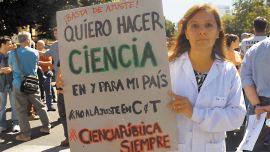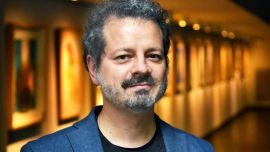Argentina delivered a clear challenge to the International Monetary Fund on Wednesday, outlining its hopes for a new financing programme and revealing that it believes the multilateral lender’s targets would threaten the country’s economic recovery.
At an event attended by Cabinet officials, provincial governors and business leaders and most notably, not the opposition, President Alberto Fernández called on the international community to support his government’s bid to reach a new financing agreement with the Fund.
Argentina is seeking a new extended fund facility programme with the IMF to restructure its existing US$44-billion debt, delivered as part of the lender’s record US$57-billion credit-line agreed in 2018 with the government of former president Mauricio Macri, Fernández’s predecessor in office.
Addressing those gathered at the Bicentennial Museum, next to the Casa Rosada, the seat of government, Fernández and his Economy Minister Martín Guzmán said they were optimistic a deal could be reached. They acknowledged, however, that the government has so far been unable to settle differences with the IMF on the size of Argentina’s fiscal deficit in the years to come.
"I am optimistic because I believe we are going to achieve a restructuring that is convenient for Argentina," said Fernández.
He went to appeal "to the responsibility of those who gave that loan when it was not viable," alluding to the nations that signed off on the 2018 stand-by and who are presumingly reluctant to accompany the government's demands.
The president also returned to a previous point of contention, reiterating his demand for the IMF to exempt Argentina from the payment of surcharges (due to the high amount of the loan granted), and to grant longer repayment terms. He also called on the Fund to approve further negotiations around special drawing rights, IMF credits that Argentina wants to use to pay off upcoming maturities of the stand-by loan.
"We got the G20 to approve these proposals and propose them to the IMF. If the surcharges are corrected, Argentina's debt goes down a lot. If the multilateral negotiation of the special drawing rights is authorised, it opens the door to a financing channel that we don't have and we can improve our conditions," Fernández said, addressing the provincial governors in attendance.
Describing Argentina’s outstanding foreign debt as “very serious” and warning it wouldn’t be solved overnight, Fernández said that “in the best case scenario, [the country] will have to pay the existing debt plus interest in 10 years, and in the same period we will have to face the debt we restructured with private creditors".
The Peronist leader called for the debt problem to be seen as a "sequence" and not to interpret an eventual agreement with the IMF as a "definitive point of arrival."
He added: "The debt problem is very serious for the Argentine economy and it will transcend my mandate by far. It will exceed my mandate, that of 2027, and, at least, it will be present on the Argentine political scene for at least [the next] 10 years.
Clock ticking
Argentina needs to agree a new deal soon, with repayments worth more than US$19 billion due this year and next.
"We are looking to redefine the payment profile," said Guzmán, who said both sides agreed that Argentina needed to strengthen the level of its international reserves by between US$3 billion and US$4billion each year.
Gross international reserves currently stand at around US$39.5 billion, but analysts estimate that liquid reserves are below US$4 billion, a scenario that makes it impossible to meet this year’s repayments, with around US$2.9 billion due in March.
According to Guzmán, the main difference with the IMF lies in how to reduce the fiscal deficit.
"Solving fiscal problems on the basis of economic recovery is the virtuous path. What the IMF is asking for is different from what we have presented here," he said, insisting that public spending should not be cut.
“It is the point where there is no agreement,” he revealed. "The difference between what the IMF is proposing and what the Argentine government is proposing is to differentiate between a programme of austerity on real spending, which would certainly halt the recovery, versus a programme that would give continuity to the recovery of the economy."
Jabbing at Macri’s government, the minister said that "an unsustainable debt was taken on that could only be repaid if there was a shock in confidence, and we know that none of that happened”
"There is no such thing as a good agreement, what exists is a good agreement in relative terms," he added.
Warming to the theme, Fernández asserted that "for us, the word ‘ajuste’ [“adjustment,” better translated as “austerity” in this context] is banished from the discussion. For us we have to grow. We have managed to reduce the primary deficit, not because of less investment, but as a result of growth.”
Argentina’s economy grew by around 10 percent last year after registering a 9.9 percent slump in 2020 as a result of the coronavirus pandemic. But the country is still struggling with inflation running at around 50 percent annually and a poverty rate of 40 percent.
The IMF has said that any new deal must have “broad” cross-party support, but Argentina’s main opposition coalition, Juntos por el Cambio, was not represented officially at Wednesday’s event.
Three governors aligned to the opposition did send representatives, underlining their differences with the opposition leadership, namely Gerardo Morales (Jujuy), Gustavo Valdés (Corrientes) and Rodolfo Suárez (Mendoza).
Buenos Aires City Mayor Horacio Rodríguez Larreta was among those who did not attend, though he was the only regional leader not to send a representative. He explained his absence by saying that any talks over a new IMF deal should take place in Congress, brushing off the meeting as “political.”
The non-attendance was criticised by Buenos Aires Province Governor Axel Kicillof.
"Today, after throwing the stone, they hide their hand. And I'm afraid they are planning not to accompany any type of agreement," he charged. "Some of those responsible are absent at this table, where we are trying to solve the problems they generated. "
– TIMES/AFP


























Comments